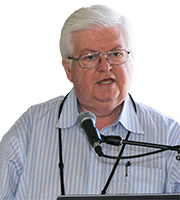When negotiating an effective Part A contract for professional pathology services, the best approach is to structure an agreement that is fair and reasonable to both the hospital and the pathologist. That’s the advice given by Robert Tessier, Senior Reimbursement Consultant, HBP Services, Inc. in an interview with Dark Daily.
In his position with the Woodbridge, Conn.-based management consulting firm, Tessier advises hospitals on their contracts with pathology groups (HBP stands for Hospital-Based Physician). However, he also helps pathology groups manage negotiations with healthcare providers for their Part A service agreements.
“Your pathology group can ultimately come up with the best package of options for all parties involved. It’s a strategy of win-win,” he said. “It’s not strictly what you get on behalf of the pathology group, but also what is negotiated that is fair and reasonable to the hospital, along with contract terms that everyone feels are mutually acceptable.”
HBP has compiled detailed data on pathology and fair market value, as well as new at-risk incentives. It’s the type of information pathologists should gather at least six months in advance of contract negotiations with hospitals and health networks.
“Pathologists want to keep what they have been able to achieve over the years, and the hospital wants more for the bottom line. They generally spend little time evaluating what is fair and reasonable for both parties,” Tessier said.
Robert Tessier will be speaking on this critical topic at the 24th Annual Executive War College in New Orleans, April 30-May 1.
Hourly Rate, Time Studies, Autopsy Pay
So, what is considered a “fair and reasonable” pathologist’s hourly rate? Under Medicare’s 2014 Final Rule CMS-1607-F, the reasonable compensation equivalent (RCE) limit for physician services is currently set at $125/hour or $260,300 a year.
“So, while hospitals are enamored with using that number as a ceiling, we have to let pathologists know it is simply guidance. And, it has to be brought forward to the cost of living in 2019,” Tessier noted. He added that $150/hour currently mirrors fair-market-value studies and reflects the “sweet spot” for a pathologist’s hourly pay for Part A services.
Additionally, to prepare for time studies that providers may request, Tessier advises pathologists to compile two two-week time studies per year that offer a reliability factor of about 95%. Based on current market data, for example, pathologists can reasonably expect to receive $1,500 to $1,800 for an autopsy.
Brush Up on New Contract Terms for Pathology Part A Agreements
In addition to fair market value, hospital attorneys also aim for “commercial reasonableness.” For example, they assess a pathology practice’s Part A support and ability to bill professional component clinical pathology, according to Tessier.
“If a practice bills 10% to 15% of payers for overseeing clinical laboratory operations, it can’t expect at the same time to be paid for Part A provided to the same payers,” he explained.
Taking Risk Incentives
Another trend in pathology Part A professional service agreements is the inclusion of at-risk incentives. Tessier suggests adding “at-risk” metrics that are supplementary to payments made to pathologists at the hourly rate.
“Hospitals now say, ‘Let’s come up with an incentive plan providing opportunities for pathologists to demonstrate additional value.’ This is the newest element in pathology contracting,” Tessier noted.
He suggests each pathologist may obtain a value-based payment in addition to the annual Part A support. This incentive pay rewards services such as reducing unnecessary lab tests, participating in outreach and marketing activities, and ensuring effective blood bank utilization, among others.
Experts also advise pathologists to remind healthcare administrators about their medical laboratory’s value throughout the year—not wait until contract negotiation time. Annual reports from the pathology group can inform hospital C-suite executives on financial indicators and changes in the operations.
Aim for Balance with a Pathology Part A Hospital Agreement
Ultimately, successful pathology contracts are achievements in balance, Tessier notes. Each party should be wary of getting too good a deal, as well as unreasonable terms.

At the upcoming 24th Annual Executive War College taking place April 30 to May 1 in New Orleans, Robert Tessier will host a breakout session on “Negotiating Win-Win Pathology Contracts with Hospitals and Health Networks and Best Approaches to Adding At-Risk Incentives That Deliver Value, Establishing Commercially Reasonable Arrangements, and Determining Fair Market Value for Part A Services.”
Attendees will learn to:
- Develop a contract that will stand the test of time;
- Ensure a contract is consistent with fair market value and commercial reasonableness; and,
- Understand the importance of ongoing dialogue with healthcare administration about the value of their medical laboratory.
Click here to register for EWC, or place this URL in your browser: https://www.executivewarcollege.com/register/, or call 707/829-8495.
—Donna Marie Pocius
Related Information:



